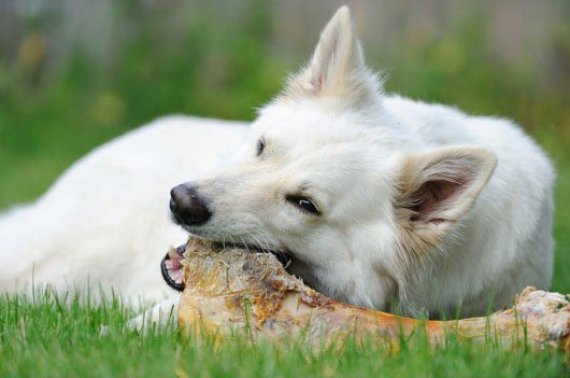For many years it was assumed that our faithful four-legged friend was an omnivore. Researchers based this assumption on a comparison with the metabolism of the cat, a true carnivore. Guido Bosch, a researcher in the Animal Nutrition chair group, now provides an alternative explanation of this difference between the dog and the cat in the British Journal of Nutrition.
He conducted a literature study on the diet and habits of wolves and concluded that they were carnivores too. An important different from wild cats is that wolves live on large prey. That means an alternation between a plentiful and a scarce supply of food. They therefore have a flexible metabolism which is adjusted to this. These adjustments to ‘all or nothing’ are still present in the contemporary dog, says Bosch. Slowing the breakdown of amino acids is functional for surviving periods of scarcity. Dogs can then manage very well without food. A study was published in 1912 in which a dog survived for 117 days without food, and there are stories about dogs that survived being locked up in a car for 30 days.
Bosch does not advise just depriving the dog of food for days on end: that would be animal abuse. He does state that nearly half our dogs are overweight. They should be put on a diet. ‘Overweight is one of the biggest health problems for our dogs and cats.’ Dogs’ preference for fatty foods may stem from the ‘all or nothing’ way of life of their ancestors. When the wolf was domesticated between 17,000 and 13,000 years ago, wolves started eating from the waste left behind by human settlements. They adapted their menu and got better at digesting starch. They changed from hunters to a species of scavenger wolf, says Bosch. The strange habit dogs have of eating excrement may stem from that time. ‘In prehistoric times human excrement may have been an important source of protein for the wolf.’
Manufacturers of dog food could usefully bear in mind the wolf’s former diet. At present, dog food often contains plant fibres which stimulate the growth of certain gut microbes. An alternative is to give the dog animal ‘fibres’(bones, cartilage, ligaments and hair). By doing that you imitate part of a wolf’s diet. Whether a wolf’s dinner is good for a dog’s health should be studied, says Bosch. He argues for a longitudinal nutritional study of dogs.

